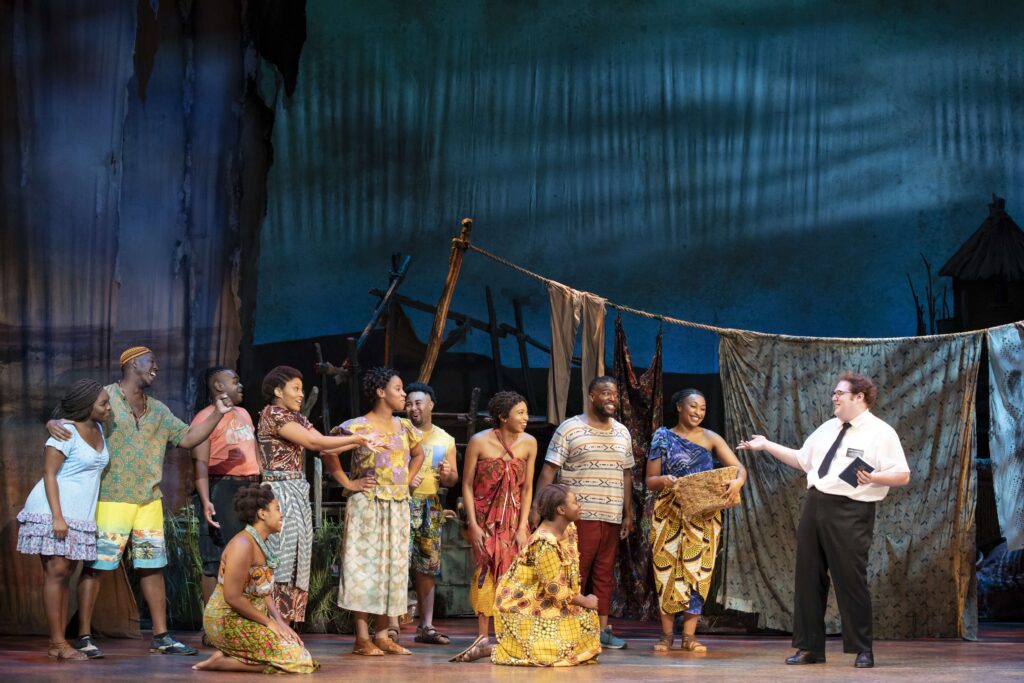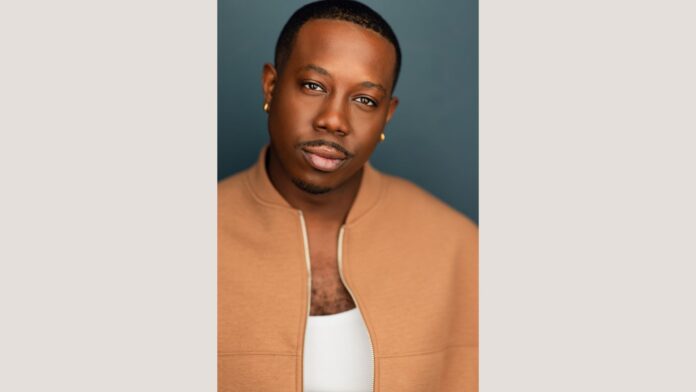In “The Book of Mormon” — which hits at the Academy of Music Oct. 1-6 as part of Ensemble Arts’ 24/25 Broadway Series — Lamont J. Whitaker plays the role of Mafala Hatimbi, a member of a Ugandan tribe who welcomes naive Mormon missionaries to his village. The villagers share their reality of living under an oppressive general and eventually team up with the missionaries to make the village their “paradise planet.” However, the musical featuring the book, music, and lyrics by Trey Parker, Robert Lopez and Matt Stone hasn’t always been seen as a progressive piece of art. The openly gay Whitaker sat down with PGN to discuss taking on Mafala, how the show has changed since it opened on Broadway in 2011, and how it “gives the power back” to the Ugandan characters.
What was your relationship to “The Book of Mormon” prior to becoming a part of the show?
“The Book of Mormon” is a huge franchise, and I’ve been wanting to do musical theater since I was very young. I went to magnet school, from middle school, high school, and I went to a college that mainly dedicated everything to the arts. It’s a show that I have heard about since 2011. I never got a chance to see it until I was in it. But being in classes, everybody always does the material. I didn’t actually think I would ever be a part of it. I didn’t know if there was a role for me. But now I know. I should have known then. I then joined the tour in 2022 in August.
Can you talk about your character?
I play Mafala Hatimbi. He has a daughter, and he just really wants her to have a different type of life than he had. He wants to encourage her to follow her heart and be true to herself. And he just really wants her to have peace and prosperity. He wants that for his whole village, but he wants to lead by example with his daughter.
How did you prepare for this role?
[Auditions started] during the pandemic, so everything was mostly on self tapes and camera. And I was currently on the national tour of “Summer: The Donna Summer Musical.” So I was in hotels, trying to find, like, a little room to record in a safe space. And that went on for almost four to five months until I heard I got the part. I went to New York City for the final callback, and I was in for various roles, [including] the ensemble. And then by the end of the process, I was in for Mafala.
My grandmother was also a chief in Badagry [a town in Nigeria]. I lived with a lot of African people in my life, so the accent [of my character] came like first nature for me — I’m actually Bahamian. I got to see firsthand her job description and things she had to do for her community in order to be true to her title. It’s sort of like a full-circle moment. She’s not with us anymore, but I get to, like, carry out her legacy and do what I love to do.

“The Book of Mormon” has been criticized in more recent years due to what people have seen as racist depictions of the Ugandan characters. Can you talk a little bit about that and how you navigated that?
“The Book of Mormon” is written by Trey Parker and Matt Stone, the hilarious writing duo of “South Park,” and this musical — not right off the bat — but as soon as my character comes in, you learn that it’s a satirical musical. At some point in this musical, you’re going to be laughing at yourself. And I feel like there are a lot of interpretations on what is right and wrong in this show. [The writers eventually] took it back to workshop, and they stripped some things that people were offended by, or that didn’t serve the story. And just for example, one of those things was Nabalungi’s typewriter. She used to have a typewriter in the musical and she would carry that around, and she would talk about writing on Facebook [via the typewriter] to people, and it kind of made her seem a little ditzy. I think that they wanted to show that the African characters in the show had a little bit more depth and intelligence. And so they ended up giving her an iPad instead. My character’s relationship with his daughter [also] became more in depth.
I think after the pandemic, people learned a lot about representation. And I think that in the past, maybe some strong words and strong things in the show rubbed people the wrong way, but I think they did work to fix it. And to be honest, if you’re a Mormon or Ugandan, you definitely might laugh, but you could be a little offended. But as far as being African American in the show, the hardest thing for me, really, is trying to give life to these characters, and trying to really show the love and what’s really happening. In rewriting the show, it really gives the power back to the Ugandans in the show. And I think that if people see it this time around, they won’t feel the same way people might have felt about it in the past.
Why do you think members of the LGBTQ+ community should see the show?
With everything that’s going on in our current climate, I think it’s very important to know that you have the power. The magic about this show is that one person really does have the power to change the perception of the whole community and of everybody. And if we really just stand up for ourselves individually and stand up for each other individually, then maybe more would happen. I think sometimes we wait for crowds or we wait for backup to really make waves and make changes. But it really starts with yourself. And I think if you come and see the show, everybody will know the power that they have alone and then, of course, once you really show people that they have their own power, then, of course, the community can come together and build and make one singular power. So I think that is the magic of this show. And I feel like, with everything that’s going on in our current climate, we need to stick together, but there’s so much that you can do alone, [even with] just your vote. And I think when people realize that they themselves can be powerful, then the world can change.
Ensemble Arts Philly presents “The Book of Mormon” Oct. 1-6 at the Academy of Music, 240 S Broad St. For more information or to purchase tickets, visit ensembleartsphilly.org.
